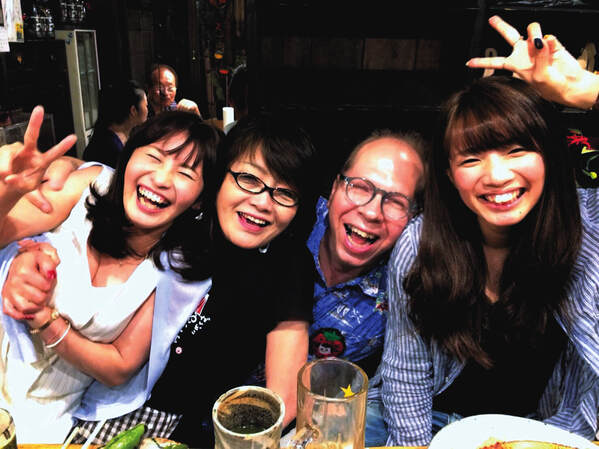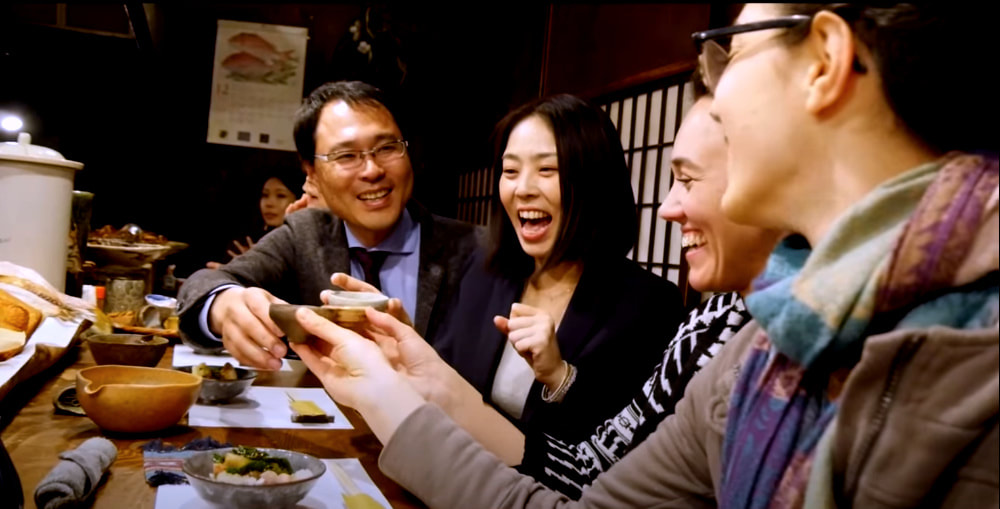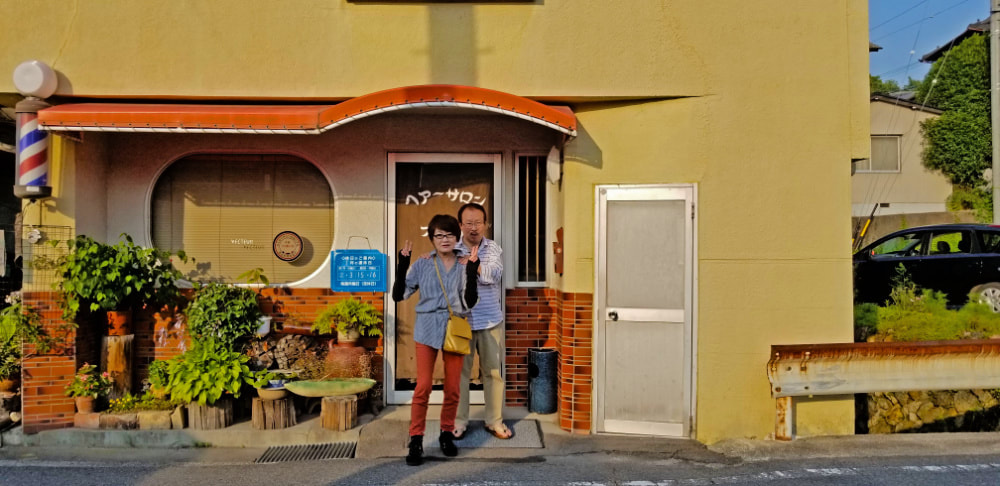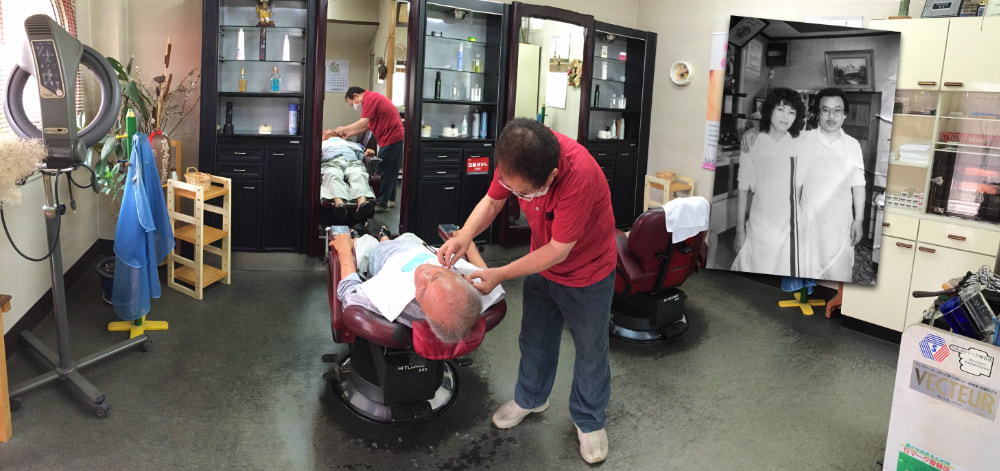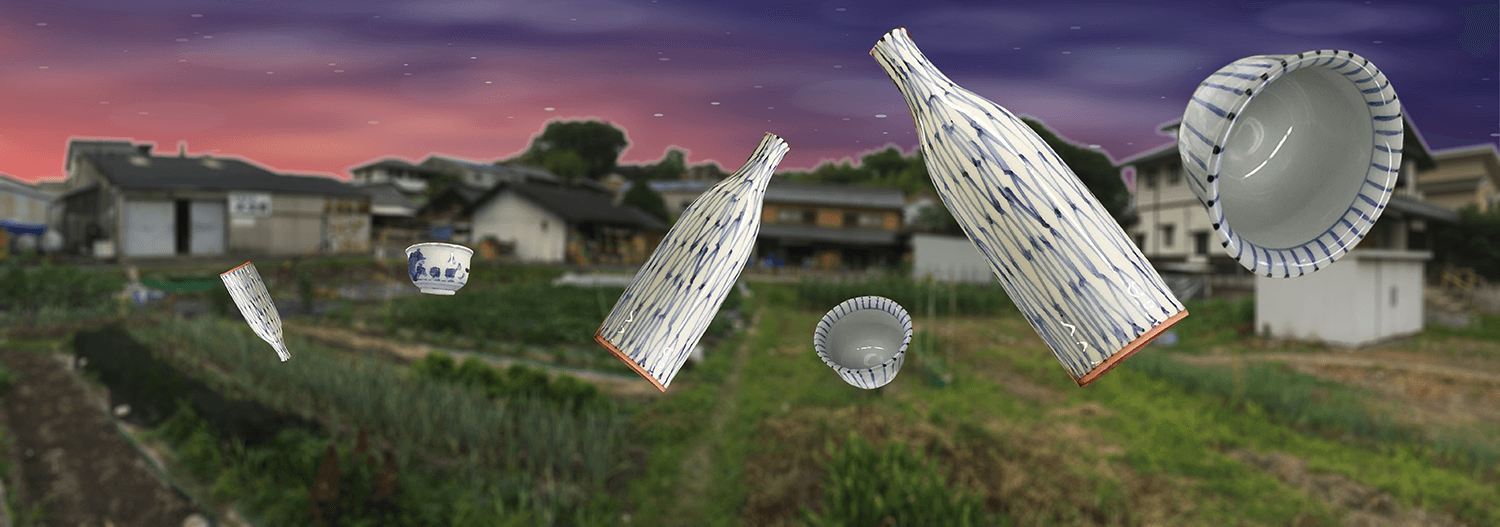Everybody Loves Fumi-chan
The woman, her dialect, and her YouTube fan club
How is it possible that a seemingly ordinary Japanese lady in her seventies becomes a hit on YouTube, in countries she has never visited or where she wouldn’t understand the language, nor the culture? Fumi-chan, a barbershop assistant and pub waitress in Tajimi, has become such a phenomenon overnight. Views of her most popular clip, “A Short Introduction to Tōnō-ben (Tōnō dialect), are approaching three-hundred thousand at the time of this writing. Two-and-a-half thousand people have subscribed to the channel since she had her debut, and many are asking for more.
Fumi-chan’s YouTube series is about dialect, and the harsh but charming way people speak in our region. Many of you interested in Japanese culture and language seem to have found pleasure in this presentation, which is comical in a sense, and has so much character thanks to Fumi-chan’s personality. Some liked the whole atmosphere, others liked words and phrases they can use when they speak Japanese - or even mixing into English. “Hahaha, I love the chōdasu (give me, please),” writes Ddaeng!!! “I’ll use it from now.” Yes, Tōnō-ben has character, just like Fumi-chan: “I love hearing Japanese dialects!”, Jordan Sullivan chimes in. “So many people seem to think that Japanese people all talk like anime characters.” Some of our viewers even got inspired to experience Tōnō-ben in the real world: “I am currently stuck in Tokyo, but hoo boy am I excited to visit over there when things open up a bit just to hear this fun dialect in person,” writes Lan Ster. Maybe it’s all about finding something genuine, outside of the mainstream conception of what Japanese culture is like. Tokyo - once a place with incredible character - is pretty bland nowadays in my view, after 25 years of living in the megacity. What charm remains lingers in the old and rustic quarters that have survived modern city planning.
Fumi-chan’s YouTube series is about dialect, and the harsh but charming way people speak in our region. Many of you interested in Japanese culture and language seem to have found pleasure in this presentation, which is comical in a sense, and has so much character thanks to Fumi-chan’s personality. Some liked the whole atmosphere, others liked words and phrases they can use when they speak Japanese - or even mixing into English. “Hahaha, I love the chōdasu (give me, please),” writes Ddaeng!!! “I’ll use it from now.” Yes, Tōnō-ben has character, just like Fumi-chan: “I love hearing Japanese dialects!”, Jordan Sullivan chimes in. “So many people seem to think that Japanese people all talk like anime characters.” Some of our viewers even got inspired to experience Tōnō-ben in the real world: “I am currently stuck in Tokyo, but hoo boy am I excited to visit over there when things open up a bit just to hear this fun dialect in person,” writes Lan Ster. Maybe it’s all about finding something genuine, outside of the mainstream conception of what Japanese culture is like. Tokyo - once a place with incredible character - is pretty bland nowadays in my view, after 25 years of living in the megacity. What charm remains lingers in the old and rustic quarters that have survived modern city planning.
But even if the original character of traditional Japan vanishes on the surface, it still lives on in dialects - and dialects are most alive in the countryside. Not everybody is aware of this. There are many misconceptions about dialects, both in Japan and elsewhere. One of the ideas I have heard during my thirty years here is that Japan is unique because of its many dialects. Many people have asked me if there are dialects in other countries. It’s a bit like the image many in this country have that only Japan has four seasons. But the Japanese are far from alone to be unaware of what the rest of the world is like. One viewer thought, for instance, that Kansai-ben was the only dialect in Japan. People on both sides of the border need to come together and talk about their image of each other's countries.
Maybe Fumi-chan isn’t one of a kind, but she has certainly connected to many people across the world basically by just being herself - charming, speaking her mind, down-to-earth, with a total lack of self-praise. To top it off she has a twinkle in her eye, and, if I dare say, a certain sex-appeal. She delivers all this packaged in rapid salvos of Tōnō-ben, unapologetically. Many of the hundreds of people that have commented so far, say that they can see some similarities with a beloved aunt or grandmother. Many also love the way she speaks, and that’s exactly what the video series is about. Fumi-chan speaks Tōnō-ben, a dialect particular to the Tōnō region here in Gifu prefecture. “Tō'' stands for “East”, and “nō” is the second part of “Mino”, the old name for this region - “East Mino” in other words. Home to many famous kilns serving the mighty samurai and their love for ceramic tea utensils. I have written a couple of other articles about Tōnō-ben and Fumi-chan (“chan” is a diminutive suffix that we add to names of people we feel affectionate about). This time I want to bring all the new fans of hers into the picture, by introducing some of the most typical or interesting comments.
Maybe Fumi-chan isn’t one of a kind, but she has certainly connected to many people across the world basically by just being herself - charming, speaking her mind, down-to-earth, with a total lack of self-praise. To top it off she has a twinkle in her eye, and, if I dare say, a certain sex-appeal. She delivers all this packaged in rapid salvos of Tōnō-ben, unapologetically. Many of the hundreds of people that have commented so far, say that they can see some similarities with a beloved aunt or grandmother. Many also love the way she speaks, and that’s exactly what the video series is about. Fumi-chan speaks Tōnō-ben, a dialect particular to the Tōnō region here in Gifu prefecture. “Tō'' stands for “East”, and “nō” is the second part of “Mino”, the old name for this region - “East Mino” in other words. Home to many famous kilns serving the mighty samurai and their love for ceramic tea utensils. I have written a couple of other articles about Tōnō-ben and Fumi-chan (“chan” is a diminutive suffix that we add to names of people we feel affectionate about). This time I want to bring all the new fans of hers into the picture, by introducing some of the most typical or interesting comments.
The air of a Southern girl
Many of the US viewers wrote that Fumi-chan’s accent reminds them of the Southern Drawl in their country. It seems neither Tōnō-ben nor the dialects in the southern states of America are considered to be beautiful or refined. However, many think they have charm. “It’s like they speak in Texas”, says Cinemint. “No i’s. Disliked by others.” Right, a typical aspect of Tōnō-ben is to not pronounce “i”. For instance, “Highball”, the name for a popular whisky-based drink here in Japan, is pronounced “Haabooru”. Many of you felt it is similar to the way speakers of various dialects who draw out the vowels and skip the “i’s” sound. It’s a fascinating thought that our video connects all these widely different languages and people through their dialects.
Chris Galpin wrote that “changing AI into AA is common in the US and northern UK. “People aren’t that different”, he wrote. Big Creature commented that Tōnō-ben is “the northern Irish dialect of Japanese”. Polymagic thinks that Tōnō-ben sounds like “Spanish and Japanese had a baby”. Ryuwuta thinks her speech even sounds like Andalusian Spanish. Others found similarities to dialects in Quebec and even Indonesia. A long discussion started around a comment that languages in the south around the world are “lazy” in this way, dragging out the vowels and skipping those “pretty i’s”, so to speak. Tōnō-ben is like “a vendetta against i,” as 56th crusader puts it.
One viewer put this very well, and even sent me a video to demonstrate how “i” is pronounced in southern accents in the US:
“Kind of reminds me of southern accents in the US. Whereas in Tōnō-ben they don't pronounce the ‘i’ sound, in southern accents there is a similar consistent omission. We don't pronounce the ‘i’ sound in some words too. In fact, we can use the same word, highlighter, as an example. It's hard for me to explain, but we cut off the ‘i’ sound at the end of ‘high’ and ‘ligh’, so each part is a single mouth movement. So instead of highlighter sounding like 5 syllables, it sounds like 3. I hope that makes sense. Some other examples are kite, knife, pie, lie, tie, rhyme, anything that has that ‘i’ sound.”
Chris Galpin wrote that “changing AI into AA is common in the US and northern UK. “People aren’t that different”, he wrote. Big Creature commented that Tōnō-ben is “the northern Irish dialect of Japanese”. Polymagic thinks that Tōnō-ben sounds like “Spanish and Japanese had a baby”. Ryuwuta thinks her speech even sounds like Andalusian Spanish. Others found similarities to dialects in Quebec and even Indonesia. A long discussion started around a comment that languages in the south around the world are “lazy” in this way, dragging out the vowels and skipping those “pretty i’s”, so to speak. Tōnō-ben is like “a vendetta against i,” as 56th crusader puts it.
One viewer put this very well, and even sent me a video to demonstrate how “i” is pronounced in southern accents in the US:
“Kind of reminds me of southern accents in the US. Whereas in Tōnō-ben they don't pronounce the ‘i’ sound, in southern accents there is a similar consistent omission. We don't pronounce the ‘i’ sound in some words too. In fact, we can use the same word, highlighter, as an example. It's hard for me to explain, but we cut off the ‘i’ sound at the end of ‘high’ and ‘ligh’, so each part is a single mouth movement. So instead of highlighter sounding like 5 syllables, it sounds like 3. I hope that makes sense. Some other examples are kite, knife, pie, lie, tie, rhyme, anything that has that ‘i’ sound.”
Intimidating but charming
Some people actually found Fumi-chan easier to understand than anime characters, for instance. Even if she is lingering on her vowels and skipping her i’s, she is well articulated, and her voice is strong and clear. She doesn’t waste any time on fancy talk. Maybe this is why so many of you like the way she speaks - the strong but kind grandmotherly figure. I have a similar feeling myself. She speaks her mind in a very straightforward way, and she has scolded me more than one time, but not in a mean way. I think Seb Cooper nailed the image here: “An intimidating but charming Italian hairdresser”. And Fumi-chan apparently reminds Mikkiboflove of the Italian North Jersey hairdressers. “They sound intimidating but it’s kinda motherly and charming”. Maybe Fumi-chan was Italian in her former life - it may be a stereotype of mine, but the image of the Italian Mama and their son’s everlasting love for them comes to mind.
Many of you fell for Fumi-chan’s personality. A part of it may be that a hairdresser’s job is hospitality and communication with customers, to make them feel as if they are in good hands. Or, rather, that it’s good for business if you have such a personality. The barbershop has been a place for human communication for centuries in Japan. A famous writer back in the Edo-era wrote a novel about a barbershop and the comical situations there. Here is a fun but chaotic modern anime based on his story. The novelist, Shikitei Sanba, became famous for the way he highlighted accents of the time.
Many of you fell for Fumi-chan’s personality. A part of it may be that a hairdresser’s job is hospitality and communication with customers, to make them feel as if they are in good hands. Or, rather, that it’s good for business if you have such a personality. The barbershop has been a place for human communication for centuries in Japan. A famous writer back in the Edo-era wrote a novel about a barbershop and the comical situations there. Here is a fun but chaotic modern anime based on his story. The novelist, Shikitei Sanba, became famous for the way he highlighted accents of the time.
Well, the hair salon in Takata is slightly more modern, but still a place to chat and exchange local news. Fumi-chan may be a natural communicator, but she also has life-long social training in her hair salon as well as in the Yaburegasa pub in downtown Tajimi, where she is hugely popular both among young and older customers. However busy she is serving the patrons, she always has time for a little conversation on the fly. Our viewer Caleb, felt she is a “free spirited” woman. Earl Grey thinks she is “wholesome and wonderful”. The kind of girl who makes pub customers return. Or barbershop ones.
Tōnō-ben is a manifestation of our local lifestyle
Dialects still prevail in the countryside around the world, and the smaller and more remote the communities the stronger the local flavour tends to be, both in terms of people’s character and the way they speak and behave. Atama okashii no komusume wrote something interesting about life on the countryside, and the section where Fumi-chan describes the remote village where she grew up:
The fact that she said "mechakucha inaka" (extremely rural) [laughing emoji]. I know how she feels. My last remaining grandma alive still lives in our village, which is the furthest south you can go before crossing the border. As soon as she said it I thought of my village and was like: "So so so so! Watashi no mura mo mechakucha desu (Exactly, my village was also extremely [rural]).”
Be careful here, komusume: Your last sentence actually means “my village is a mess” :) Add “inaka” [countryside] to the end will fix it.
There is still a sense of rural life here in the outskirts of Tajimi, which is a town of a hundred thousand but where many smaller communities live far out from the city centre, where time moves slower than in the normal world. Even our village, Onada, and Fumi-chan’s neighbouring Takata feels quite rural. We have local customs and festivals. This morning, in the freezing cold, I went to clean the shrine grounds up on the hill with the other villagers. The Takata people have their own Shinto shrine too, and the native religion still plays a part in our lives.
And all of this, the clay in the mountains, the kilns making their livelihood from it, the craftsmen’s culture, their customs and beliefs, comes together as a local culture and a lifestyle. That lifestyle manifests itself in Tōnō-ben. And the same, I believe, is true of other dialects. So to get a feeling of how people speak here is to peek into an aspect of Japanese culture.
That is a good place for a segway to one of the comments that made me most happy, one that was by c: “I was a hikikomori (withdrawn) weeb before I watched this. Now I am genuinely interested in Japanese culture.” I had to look that word up: “A weeb”, according to Dictionary.com, “is a non-Japanese person who is so obsessed with Japanese culture that they wish they were actually Japanese.” I hope c has a more balanced view of Japan now, and one that well take him/her to a better place - maybe Tajimi one day.
Perhaps after all, the core reason Fumi-chan connects so well with so many people around the world (without really knowing it, she doesn’t watch YouTube) is that there is something genuinely warm and genuine about her. That motherly love many of you spoke about. She is not an academic person, far from it, and lives a simple life. But her personality reminds me of the words in an old Sam Cook song:
The fact that she said "mechakucha inaka" (extremely rural) [laughing emoji]. I know how she feels. My last remaining grandma alive still lives in our village, which is the furthest south you can go before crossing the border. As soon as she said it I thought of my village and was like: "So so so so! Watashi no mura mo mechakucha desu (Exactly, my village was also extremely [rural]).”
Be careful here, komusume: Your last sentence actually means “my village is a mess” :) Add “inaka” [countryside] to the end will fix it.
There is still a sense of rural life here in the outskirts of Tajimi, which is a town of a hundred thousand but where many smaller communities live far out from the city centre, where time moves slower than in the normal world. Even our village, Onada, and Fumi-chan’s neighbouring Takata feels quite rural. We have local customs and festivals. This morning, in the freezing cold, I went to clean the shrine grounds up on the hill with the other villagers. The Takata people have their own Shinto shrine too, and the native religion still plays a part in our lives.
And all of this, the clay in the mountains, the kilns making their livelihood from it, the craftsmen’s culture, their customs and beliefs, comes together as a local culture and a lifestyle. That lifestyle manifests itself in Tōnō-ben. And the same, I believe, is true of other dialects. So to get a feeling of how people speak here is to peek into an aspect of Japanese culture.
That is a good place for a segway to one of the comments that made me most happy, one that was by c: “I was a hikikomori (withdrawn) weeb before I watched this. Now I am genuinely interested in Japanese culture.” I had to look that word up: “A weeb”, according to Dictionary.com, “is a non-Japanese person who is so obsessed with Japanese culture that they wish they were actually Japanese.” I hope c has a more balanced view of Japan now, and one that well take him/her to a better place - maybe Tajimi one day.
Perhaps after all, the core reason Fumi-chan connects so well with so many people around the world (without really knowing it, she doesn’t watch YouTube) is that there is something genuinely warm and genuine about her. That motherly love many of you spoke about. She is not an academic person, far from it, and lives a simple life. But her personality reminds me of the words in an old Sam Cook song:
Don’t know much about history.
Don't know much biology
Don't know much about science book
Don't know much about the French I took
But I do know that I love you
And I know that if you love me too
What a wonderful world this would be
Sam Cooke - “Don't Know Much About History”
Don't know much biology
Don't know much about science book
Don't know much about the French I took
But I do know that I love you
And I know that if you love me too
What a wonderful world this would be
Sam Cooke - “Don't Know Much About History”
By those words I end this piece, and hope you’ll learn Tōnō-ben, or whatever dialect or language you choose, by living it, and meeting people like Fumi-chan. Acquiring language that way is never painful, and it sticks.
